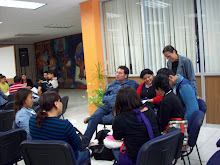
Children queue up to get some rice in Dedaye, south of Yangon.
YANGON, Myanmar (CNN) -- A U.S. military airplane with relief supplies was scheduled to land in Myanmar Monday on a mission that American officials say they hope will "build trust."
The United States said it received permission to land the Lockheed C-130 Hercules at 2 p.m. local time (0730 GMT), and hopes to send in two more planes on Tuesday.
The supplies that the C-130 is carrying -- wood, buckets, nails, blankets and plastic tarps, among items to help with shelter needs -- will be handed to the military junta that rules Myanmar.
But commanding officers hope the mission will help forge a relationship that will allow the United States to send in disaster experts.
The United Nations estimates the death toll from last weekend's Cyclone Nargis ranges from 63,000 to 100,000, well above the Myanmar government's estimate of about 22,000. Tens of thousands of people are missing. Watch villagers' struggle in wake of cyclone »
The military junta has said it will accept international aid but insisted it would distribute the supplies itself.
"We're getting, starting to get reports of aid being distributed with the names of military leaders and VIPs plastered all over the aid packages," said Debbie Stothard, head of the Southeast Asian human rights group ALTSEAN-Burma. Watch allegations that Myanmar's junta is taking credit for aid »
"There's people who are very concerned now, that the reason the aid workers are being blocked is so that the military can deliver aid selectively and so that they can appropriate the aid and pretend it was from them in the first place."
The country's name was changed from Burma to Myanmar in 1989, but many who do not recognize the current government still use its former name.
An American embassy official in Thailand said the aircraft carrier, USS Essex, was also en route to Myanmar with supplies.
A French naval ship is also on its way toward Myanmar, transporting 1,500 tons of medical equipment, food and water.
Bernard Kouchner, the French foreign minister, said French aid will go directly to the victims.
"We won't give aid to Burma's junta, even if they would accept it. We will use our own channels in the country."
Also Sunday, Australia pledged $25 million in aid to Myanmar.
Half the money will go to international relief agencies and non-governmental organizations. The other half will go to the United Nations, a spokesman with the Department of Foreign Affairs and Trade said.
Three planes carrying 14 tons of shelter from the International Federation of Red Cross and Red Crescent Societies landed at the Yangon International Airport on Saturday. Two more arrived from the U.N. World Food Program, which temporarily halted flights Friday after the government refused to let their workers pass out the supplies.
Additional flights by the WFP and other U.N. agencies in various countries were expected, said WFP's chief spokeswoman in North America, Bettina Luescher.
Meanwhile, a Red Cross boat delivering relief supplies to the hard-hit Irrawady Delta region sank Sunday when it hit debris in the river, a spokesman said.
The four relief workers on the double-decker boat were not hurt, said Eric Porterfield with International Federation of Red Cross and Red Crescent Societies. The boat was carrying rice, water, clothing and other household items.
"It's always risky when you're trying to deliver aid in areas that have debris," he said.
As aid groups struggled to overcome obstacles slowing their distribution of supplies to cyclone victims, Myanmar TV was broadcasting messages urging citizens to vote "yes" in a referendum that critics say would strengthen the military rule.
The marketing campaign showed pictures of people voting as a song played with the lyrics, "Let's go to cast vote with sincere thoughts for happy days." Similar notes were posted on ballot boxes.
"The state on the ground remains essentially the same and the so-called referendum, in which voting took place yesterday, on the reports we've had, effectively took place without incident," said Australian Foreign Minister Stephen Smith.
"But I again make the point as I've made consistently: Australia regards the referendum process as nothing more, nothing less than a sham. And our view would be the referendum process be deferred completely, rather than just being deferred until the 24 May in the most adversely affected areas."


.jpg)











